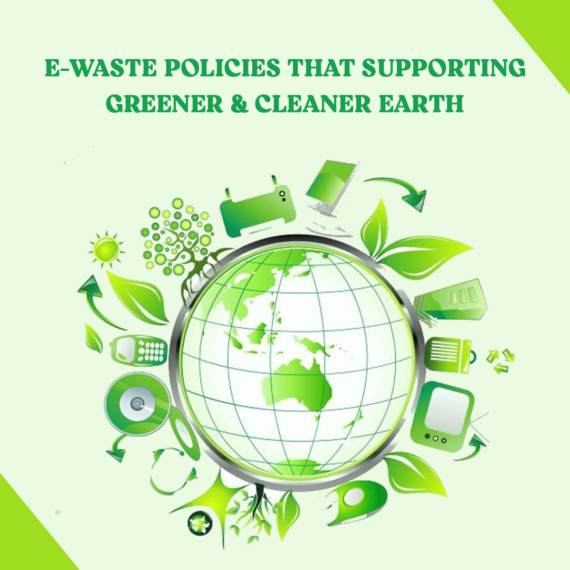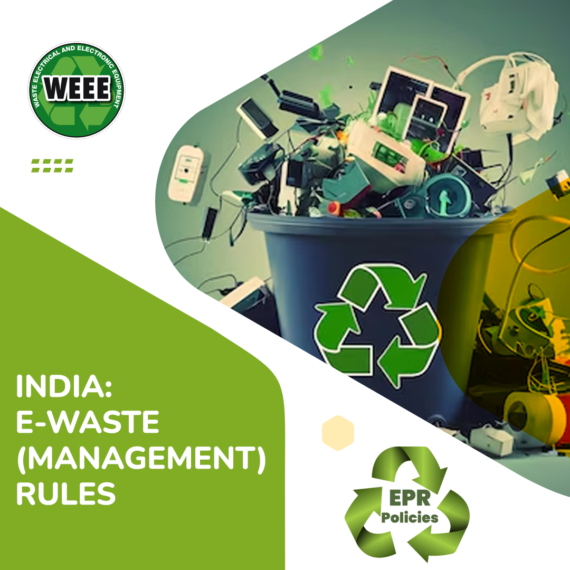
Top 5 E-Waste Policies Around the World You Should Know
E-waste is growing at an alarming rate. What are we doing about it?”
As we are becoming increasingly dependent on smart technology, electronic waste (e-waste) is also growing rapidly. Old gadgets, obsolete devices, and discarded electronics contribute to one of the fastest-growing waste streams globally. Proper e-waste management is essential to prevent environmental degradation, recover valuable materials, and ensure the sustainable use of resources. Different countries have adopted various policies to tackle this issue. Here are the top five e-waste policies around the world that you should know about.
E-waste Policies That Supporting Greener & Cleaner Earth Initiative-

1. European Union: Waste Electrical and Electronic Equipment (WEEE) Directive
The European Union’s WEEE Directive is one of the most comprehensive and stringent e-waste policies globally. Implemented in 2003, this directive aims to reduce the environmental impact of electronic waste. Here are its key features:
Producer Responsibility: Under the WEEE Directive, producers are held accountable for the complete lifecycle of their products, from production to disposal. They must finance the collection, treatment, and environmentally sound disposal of e-waste. It encourages manufacturers to create more sustainable products.
Collection Targets: The directive sets ambitious collection and recycling targets. For example, by 2019, EU member states were required to collect 65% of the average weight of electrical and electronic equipment placed on the market in the three preceding years or 85% of e-waste generated. It ensures a high percentage of e-waste is properly managed.
Eco-Design Requirements: The directive promotes eco-design, encouraging manufacturers to design products that are simple to dismantle, recycle, and repair. It aids recycling efforts and supports the circular economy by extending the lifespan of products.
The WEEE Directive has significantly increased European e-waste recycling rates and set a strong example for other regions.
2. Japan: Home Appliance Recycling Law (HARL)
Japan’s Home Appliance Recycling Law (HARL) focuses on recycling major household appliances, such as televisions, refrigerators, washing machines, and air conditioners. Key aspects of this policy include:
Shared Responsibility: The law assigns specific roles to manufacturers, retailers, and consumers. Manufacturers and importers must take back and recycle discarded appliances. Retailers are required to collect used appliances from consumers when delivering new ones. Consumers bear the cost of recycling through a fee when they purchase new appliances.
Recycling Fees: Consumers pay a recycling fee at the time of purchase. This fee covers the cost of collecting, transporting, and recycling the appliance at the end of its life. This system ensures that the financial burden of recycling is shared among all stakeholders.
Recycling Targets: The law sets specific recycling targets for different materials, such as plastics, glass, and metals, to ensure that valuable resources are recovered and reused. For example, manufacturers must recycle 70% of the materials from air conditioners.
Japan’s proactive approach has led to high recycling rates and reduced the environmental impact of e-waste.
3. United States: State-Level E-Waste Legislation
In the United States, e-waste policies vary significantly from state to state due to the absence of federal e-waste law. Some states have implemented robust e-waste recycling programs. Notable examples include:
California’s Electronic Waste Recycling Act: Enacted in 2003, this law requires consumers to pay an advance recycling fee when purchasing certain electronic devices. The collected funds are used to support e-waste recycling programs and facilities.
New York State Electronic Equipment Recycling and Reuse Act: This law mandates that manufacturers provide consumers with free and convenient recycling options. It also sets specific collection targets to ensure a high recycling rate of e-waste.
Washington: The E-Cycle Washington program mandates manufacturers finance electronic product collection, transportation, and recycling.
These state-level policies have made significant strides in improving e-waste management despite the absence of a unified federal policy.
4. South Korea – Extended Producer Responsibility (EPR)
South Korea’s Extended Producer Responsibility (EPR) system, introduced in 2003, places the responsibility on manufacturers to manage the entire lifecycle of their products. This policy covers various products, including electronics, packaging, and batteries. Key features include:
Producer Accountability: Manufacturers are required to collect and recycle a certain percentage of the products they sell. This requirement encourages them to design products that are easier to recycle and have less environmental impact.
Financial Incentives: Companies that meet or exceed their recycling targets can receive financial incentives, while those that fail to meet the targets may face penalties. It creates a strong motivation for companies to invest in sustainable practices.
Public Awareness Campaigns: The government runs extensive public awareness campaigns to inform consumers about the importance of e-waste recycling and how they can participate. It helps increase the collection and proper disposal of e-waste.
5. India: E-Waste (Management) Rules

India’s E-Waste (Management) Rules, established in 2016 and amended in 2018, provide a comprehensive framework for e-waste management. Key components include:
Producer Responsibility Organizations (PROs): Manufacturers can fulfill their extended producer responsibility through PROs, which manage e-waste collection and recycling on behalf of multiple producers.
E-Waste Collection Centers: The policy mandates the establishment of e-waste collection centers to provide consumers with convenient drop-off points for their discarded electronics. This will help increase the volume of e-waste collected for recycling.
Public Awareness: The government and private organizations run campaigns to educate the public about the importance of e-waste recycling and how to dispose of electronic devices properly.
Last Say!
E-waste policies around the world reflect diverse approaches to tackling a common problem. The success of these policies depends on the cooperation between governments, manufacturers, and consumers. We can all contribute to a cleaner, more sustainable future by understanding and supporting these initiatives. These policies offer valuable lessons and can inspire further improvements in global e-waste management practices.
Read Our More Blogs:
What Are the Risks of DIY E-Waste Recycling?
Benefits of Implementing a Zero E-Waste Policy in Your Business
Follow us:







